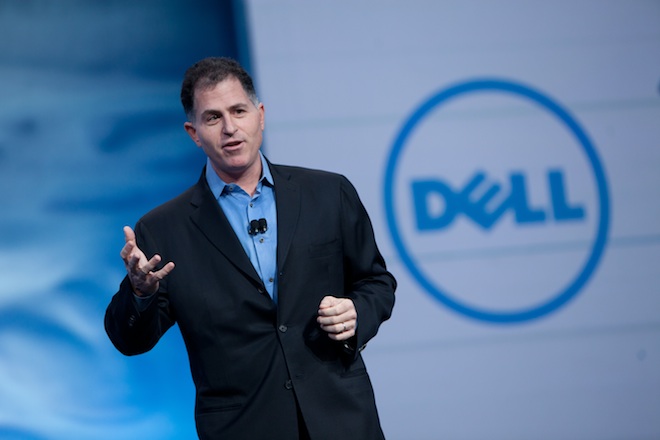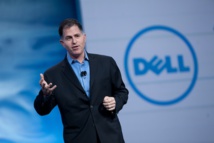According to IDC, the leader of the computer market is now the Chinese company Lenovo, which accounts for 20.3% of total PCs shipments. Second place holds Hewlett-Packard (18,5%), and closes the top three Dell (14,5%). The closing position in the top three, however, does not prevent Dell from being ahead of the two closest competitors in terms of growth in notebook sales.
According to Michael Dell, the three market leaders will be able to take up to 80% of the market in the next 5-7 years due to consolidation. Small players can leave it or come under control of large companies.
Dell, once the leader in the PC market along with other representatives from the computer industry, has suffered from the rapid regression, which occurred amid rising consumer interest in smartphones and tablets. IDC’s experts warn that PC shipments in 2015 may be reduced more than expected earlier. According to the August forecast, slowdown in the computer market would reach 8.7%, whereas the previous forecast expected a decline of 6.2%. The experts anticipate the positive dynamics to return no earlier than 2017.
In 2013, CEO Michael Dell, supported by an investment partner Silver Lake Partners, bought out the corporation’s shares, thus made it a private company. The privatization costed $ 24.9 billion. Now, Dell is trying to transform his company, founded in 1984, in a supplier of a full range of computer services for corporations, such as HP or IBM.
- We were able to grow even in the face of shrinking PC market. Our business extends far beyond the production of computers and includes equipment for data centers, software, services, and information security, - he said.
Dell also said that access to the market for smartphones is not listed in the plans of Dell. In this segment, according to him, there is one or two companies able to make a profit, while the rest are losing money. Dell clearly does not want to join the latest.
It is worth noting that in its time Dell was considered one of the pioneers in tablet market, if we consider the traditional manufacturers of ready-to-work PCs. At the time, the company reckoned devices with screens of 3 to 5 inches among tablets, often giving them the ability to work in 3G networks.
These devices’ characteristics differed little from smartphones, yet, according to the classification of the producer, fell into tablets’ category.
It must be noted that Dell gradually was forced to stop releasing the tablets: it was expensive and not very competitive on the background of the rapid evolution of smartphones running Android.
PC market shows the strongest decline in the last two years, as evidenced by the latest report from market research firm Gartner. One of the main reasons was the high rate of the US currency.
In II quarter of 2015, worldwide PC shipments reached 68.4 million units, down 9.5% compared to the same period last year. Economists had expected a decline of 4.4%. The falling was the strongest since mid-2013.
Computer hardware has become less attractive to consumers because of rising prices, which is a consequence of the strengthening dollar. In addition, the indicator was influenced by release of a new operating system from Microsoft - Windows 10. Many consumers, want to upgrade their PCs, decided to wait for the release and buy the device with a new OS.
A strong start to the quarter also had its influence on the segment. Then, the brisk demand was related to the termination of official support for Windows XP. Once Microsoft refused supporting the obsolete OS, the computer industry has no any significant growth drivers. Computer manufacturers and their partners actively began clearing warehouses before the launch of Windows 10, said the chief analyst at Gartner Mikako Kitagawa.
source: ndtv.com
According to Michael Dell, the three market leaders will be able to take up to 80% of the market in the next 5-7 years due to consolidation. Small players can leave it or come under control of large companies.
Dell, once the leader in the PC market along with other representatives from the computer industry, has suffered from the rapid regression, which occurred amid rising consumer interest in smartphones and tablets. IDC’s experts warn that PC shipments in 2015 may be reduced more than expected earlier. According to the August forecast, slowdown in the computer market would reach 8.7%, whereas the previous forecast expected a decline of 6.2%. The experts anticipate the positive dynamics to return no earlier than 2017.
In 2013, CEO Michael Dell, supported by an investment partner Silver Lake Partners, bought out the corporation’s shares, thus made it a private company. The privatization costed $ 24.9 billion. Now, Dell is trying to transform his company, founded in 1984, in a supplier of a full range of computer services for corporations, such as HP or IBM.
- We were able to grow even in the face of shrinking PC market. Our business extends far beyond the production of computers and includes equipment for data centers, software, services, and information security, - he said.
Dell also said that access to the market for smartphones is not listed in the plans of Dell. In this segment, according to him, there is one or two companies able to make a profit, while the rest are losing money. Dell clearly does not want to join the latest.
It is worth noting that in its time Dell was considered one of the pioneers in tablet market, if we consider the traditional manufacturers of ready-to-work PCs. At the time, the company reckoned devices with screens of 3 to 5 inches among tablets, often giving them the ability to work in 3G networks.
These devices’ characteristics differed little from smartphones, yet, according to the classification of the producer, fell into tablets’ category.
It must be noted that Dell gradually was forced to stop releasing the tablets: it was expensive and not very competitive on the background of the rapid evolution of smartphones running Android.
PC market shows the strongest decline in the last two years, as evidenced by the latest report from market research firm Gartner. One of the main reasons was the high rate of the US currency.
In II quarter of 2015, worldwide PC shipments reached 68.4 million units, down 9.5% compared to the same period last year. Economists had expected a decline of 4.4%. The falling was the strongest since mid-2013.
Computer hardware has become less attractive to consumers because of rising prices, which is a consequence of the strengthening dollar. In addition, the indicator was influenced by release of a new operating system from Microsoft - Windows 10. Many consumers, want to upgrade their PCs, decided to wait for the release and buy the device with a new OS.
A strong start to the quarter also had its influence on the segment. Then, the brisk demand was related to the termination of official support for Windows XP. Once Microsoft refused supporting the obsolete OS, the computer industry has no any significant growth drivers. Computer manufacturers and their partners actively began clearing warehouses before the launch of Windows 10, said the chief analyst at Gartner Mikako Kitagawa.
source: ndtv.com



















